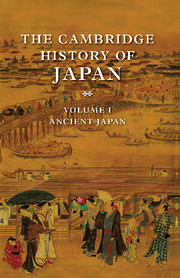Book contents
- Frontmatter
- Introduction
- 1 The earliest societies in Japan
- 2 The Yamato kingdom
- 3 The century of reform
- 4 The Nara state
- 5 Japan and the continent
- 6 Early kami worship
- 7 Early Buddha worship
- 8 Nara economic and social institutions
- 9 Asuka and Nara Culture: literacy, literature, and music
- 10 The early evolution of historical consciousness
- Works Cited
- Index
9 - Asuka and Nara Culture: literacy, literature, and music
Published online by Cambridge University Press: 28 March 2008
- Frontmatter
- Introduction
- 1 The earliest societies in Japan
- 2 The Yamato kingdom
- 3 The century of reform
- 4 The Nara state
- 5 Japan and the continent
- 6 Early kami worship
- 7 Early Buddha worship
- 8 Nara economic and social institutions
- 9 Asuka and Nara Culture: literacy, literature, and music
- 10 The early evolution of historical consciousness
- Works Cited
- Index
Summary
This chapter deals with the literature and music of Japan during the two centuries between the acceptance of Buddhism in 587 and the abandonment of the Nara capital in 784. These were years of vast and fundamental change in the island kingdom, of cultural forced feeding and vigorous new growth. In particular, they were the years when Japan became fully and for all time a participant in the high civilization of East Asia. Participation meant religious and philosophical orientations, an ideal of imperial rule, legal and administrative structures, techniques and styles of architecture, city planning, sculpture, painting, and music – all derived directly or indirectly from China and shared in one degree or another by the peoples on its periphery. Above all, it meant literacy: the mastery of the Chinese language and the eventual adaptation of its script to the writing of Japanese. From literacy came ventures in historiography – at once a definition and a redefinition of the Japanese state – and in poetry. Emulation of China led the newly literate Japanese to compose verses in Chinese modeled on the ones they found in Chinese anthologies, and it also led them to write down their own songs and to turn the native prosody into high poetic art. The myths, legends, folk and hero tales of the oral tradition were also written down in the first histories and local gazetteers, to form the beginnings of a prose literature.
- Type
- Chapter
- Information
- The Cambridge History of Japan , pp. 453 - 503Publisher: Cambridge University PressPrint publication year: 1993
- 1
- Cited by



